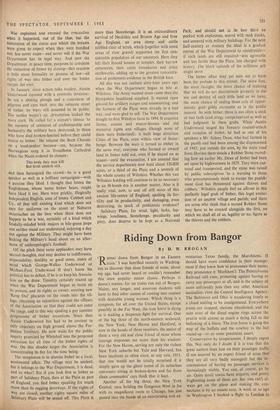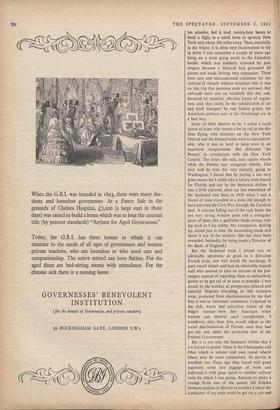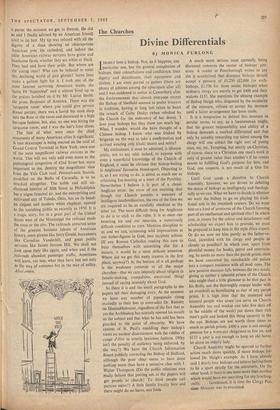Riding Down from Bangor
B y D. W. BROGAN IDING down from Bangor in an Eastern train.' I was horrified recently in Washing- ton to discover that close friends of mine, about my age, had never heard or couldn't remember this once popular minor classic. Perhaps it doesn't matter, for no trains run out of Bangor, Maine, any longer, and amorous students will have to find other means of coming into contact with desirable young women. Which thing is a symptom, for all over the United States, except possibly in the Far West, the iron horse is dying or is making a desperate fight for survival. One of the big three of the north-eastern seaboard, the New York, New Haven and Hartford, is now in the hands of three receivers, the senior of them a very old and close friend of .mine whose Courage impresses me more than his wisdom. For the New Haven, serving not only the richest New York suburbs but Yale and Harvard, has been insolvent so often since, at any rate, 1911, that one would not be totally surprised if it simply gave up the ghost (some of its suburban customers sitting in broken-down and far from clean commuters' cars think that it has).
Another of the big three, the New York Central, once holding the Gorgeous West in fee with its magnificent route to Chicago, has just passed into the hands of an enterprising and ad- venturous Texas family, the Murchisons. (I should have more confidence in their manage- ment if they knew how to pronounce their name; they pronounce it 'Murkison'). The Pennsylvania Railroad still runs, protesting against having to carry any passengers at all, and is the subject of more unfriendly jests than any other American institution, even the Central Intelligence Agency. The Baltimore and Ohio is wandering lonely as a cloud waiting to be amalgamated. Everywhere trains are stopped, stations abandoned, and the note even of the diesel engine rings across the prairie with almost as much a dying fall as the bellowing of a bison. The iron horse is going the way of the buffalo and the cowboy to the last round-up—or so some pessimists assert.
Conservative by temperament, I deeply regret this. Not only do I doubt if it is true that the great eastern lines lose on their passenger traffic (I am assured by an expert friend of mine that they are all very badly managed) but the in- convenience of having no passenger services is increasingly visible. You can, of course, go by air. Quite small towns have airports, and pretty frightening some of them are. But you can't al- ways get on the plane and making the con- nections is by no means easy. A week or so ago in Washington I booked a flight to London in ten minutes, but it took twenty-four hours to book a flight to a small town in up-state New York only about 300 miles away. Then, especially in the winter, it is often very inconvenient to try to drive. I can remember a couple of years ago being on a train going north to the Canadian border which was suddenly crowded by pas- sengers because a blizzard had grounded all planes and made driving very unpopular, These were new and unaccustomed customers for the railroad (I remark without emphasis that it was on this trip that someone stole my suitcase). But railroads can't run on windfalls like this and, harassed by taxation, obsolete forms of regula- tion, and, they claim, by the subsidisation of air and truck transport by vast federal grants, the American railways east of the Mississippi are in a bad way.
Some of them deserve to be. 1 asked a lucid friend of mine, who travels a lot by rail as she dis- likes flying, why journeys on the New York Central and the Pennsylvania were so uncomfort- able, why it was so hard to sleep even in an expensive compartment. She defended 'the Pennsy' in comparison with the New York Central. The latter, she said, uses square wheels while the Pennsy uses octagonal wheels. This may well be true, for very recently, going to Washington, I found that by paying a not very great excess fee I could take a luxury train bound for Florida and run by the Seaboard Airline. 1 was a little alarmed, since my last experience of the Seaboard had been in 1926 when 1 and a friend of mine travelled in a train old enough to have survived the Civil War through the Carolina heat. A suitcase falling out of the rack broke the not very strong window pane and a triangular piece of glass like a guillotine blade swung over my neck as 1 lay asleep. My companion, waking up, seized just in time the descending blade and threw it out of the window. (He has since been rewarded, belatedly, by being made a Director of the Bank of England.) But the Seaboard train I joined was an admirable specimen, as good as a first-class French train, and well worth the surcharge. It used round wheels and had an admirably trained staff who seemed to take an interest in the pas- sengers instead of regarding them as melancholy ghosts to be got rid of as soon as possible. I was struck by the number of prosperous, relaxed and cheerful Negroes travelling in this exclusive train, protected from discrimination by the fact that it was in 'interstate' commerce. I rejoiced in the rich, warm and attractive voices of the Negro women—how few American white women can deserve such compliments. I wondered, also, how they would adjust to the racial discrimination of Florida once they had got out and under the protective arm of the Federal Government.
But it is not only the Seaboard Airline that I am forced to praise. There is the Chesapeake and Ohio which is solvent and uses round wheels (there may be some connection). Its service is excellent too. Years ago they found with great ingenuity some lost luggage of mine and delivered it with great speed to another railway train by which I was going. Anxious to, make a change from one of the quaint old Zuleika Dobson stations in Detroit to another I asked the conductor of my train could he get me a cab and a porter the moment we got to Detroit. He did so and I (badly advised by an American friend) tried to tip him. My tip was refused with all the dignity of a dean showing an obstreperous American over his cathedral, and indeed the older American railway servants have grave and handsome faces, whether they are white or black. They had and have their pride. But where are the young ones? Who can he induced to enter this declining world of past glories? Some lines make a gallant fight for it. I took one of the most famous surviving American trains, the Santa Fe 'Superchief' and it almost lived up to the praises lavished on it by Mr. Lucius Beebe. the prose Betjeman of America. There was the 'turquoise room' where you could give private dinner parties; there was a lavish bar sunk deep into the floor or the room and decorated in a high baroque fashion, but, alas, no one was hiring the turquoise room, and I was the bar's lone client.
The fate of what were once the chief ornaments of many American cities is significant. A vast skyscraper is being erected on the roof of Grand Central Terminal in New York, once one of the most magnificent railway stations in the world. This will not only add even more to the pathological congestion of 42nd Street but, more Important to me, destroy the magnificent view from the Yale Club roof. Pennsylvania Station, modelled on the Baths of Caracalla, is to be wrecked altogether. The noble and still un- cluttered interior of 30th Street in Philadelphia has a vague funereal air, and the enterprising and cultivated city of Toledo, Ohio, has on its hands an elegant and modern white elephant, opened to the vanishing public as recently as 1950. It is a tragic story, for in a great part of the United States west of the Mississippi the railroad made the state or the city. The railroads attracted some of the greatest business talents of American history, mere pirates like Jerry Gould, buccaneers like Cornelius Vanderbilt, and great public servants like James Jerome Hill. We shall not look upon their like again, and when and if the railroads abandon passenger traffic, Americans will learn, too late, what they have lost not only In the way of romance but in the way of utility. Absit omen.




































 Previous page
Previous page